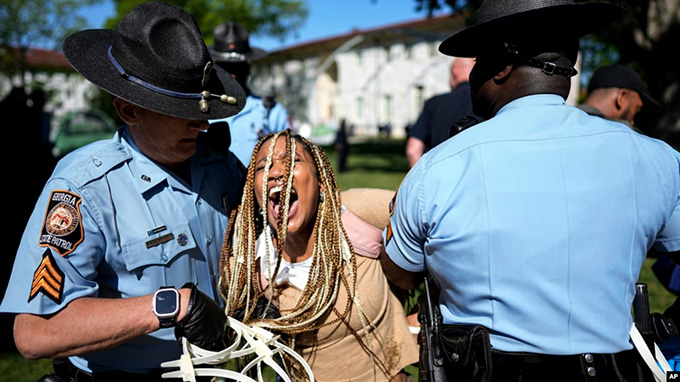
College is a fun-filled place that every student looks forward to. It offers numerous opportunities capable of unlocking a fulfilling future. Unfortunately, the prospects of all these can end abruptly if you get arrested on campus.
Students can be arrested for different reasons on campus, such as participating in protests, underage drinking, drunk driving, sexual assault, and illegal drug possession.
Like any other charge, every suspect is presumed innocent until proven guilty. Any person arrested and detained in allegations of committing a crime is entitled to bail, except otherwise stated by a judge based on the severity of their crime.
However, to fulfill the condition of bail, an arrested student may need to pay a bail amount.
This amount is an incentive for the suspect to appear in court.
Sometimes, you may not have the financial resources to pay the bail amount or be unable to get the money quickly. This is where a fiancista steps in. A bail bondsman can post the bail on your behalf and guarantee the court you will always be available whenever needed.
Legal consequences of being arrested on campus
Many colleges do have an on-campus police department, which may escalate some issues to local law enforcement. Outsiders may also report illegal activities perpetrated by students to their school if the behavior could or did impact the school or other students.
Some of the common issues that campus security usually escalates to the local police
department include:
• Theft: It includes stealing from other students, faculty, staff, or local businesses.
• Vandalism: Damaging school property such as buildings, vehicles, or personal belongings. This is common during campus protests.
• Driving under the influence (DUI): Driving after drinking alcohol is an activity rampant among college students. This can, however, lead to an arrest, as it is against the law to drive while intoxicated.
• Assault: Physically attacking another student or staff of the college.
• Falsifying academic records: This includes altering grades or transcripts. Some students commit this crime by hacking into the school’s computer systems.
• Possession or use of illegal drugs: This can lead to both criminal charges and
disciplinary action from the institution.
The legal consequences of being arrested on campus depend on the nature of the alleged offense. You may face criminal charges, which could result in fines, probation, or even jail time, depending on the severity of the offense.
Also, an arrest, even if it does not lead to a conviction, can leave a mark on your criminal record. This can have long-term consequences for employment, housing, and education.
Can you get kicked out of college for being arrested?
Each university has its own specific rules and procedures regarding student conduct and disciplinary actions. Being arrested even if you are not convicted can lead to disciplinary action, including suspension or expulsion.
Aside from this, criminal charges may affect a future educational pursuit, as most public
institutions require students to answer criminal history questions while applying for
admission.
What to do if arrested on campus
It is important to remain calm and collected if you find yourself arrested on campus. In addition, here are some other steps you should take:
Understand your right
If arrested, you have Miranda rights. This includes the right to remain silent and the right to an attorney.
Also, research the university’s policies regarding student arrests and possible disciplinary actions.
Contact an attorney
Do not hesitate to contact a lawyer who specializes in the field related to your charges or offenses. They are your best bet in navigating this difficult time and can guide you on your rights.
If you do not have a lawyer and cannot afford one, check with your university’s student affairs office. Some universities offer legal services to their students.
Follow university procedures
Even if your actions and arrest violate your college’s student code of conduct, it will be easier to navigate possible disciplinary actions if you know what to expect.
Check out materials and campus resources that can guide you on the procedures for reporting and addressing the incident.
Ensure you adhere to the institution’s disciplinary procedures because failing to do so could result in additional consequences.
Document everything
Keep a record of the entire arrest process, including the names of officers involved, the exact time and date, and any statements made by law enforcement.
Things to expect
Law enforcement will treat a student arrested for an offense like any other suspect arrested off campus.
You could be released immediately or detained for up to two days before your arraignment.
If your arrest occurs on a holiday or weekend, expect to spend more days in custody because your initial court appearance might be delayed.
Depending on the type of offense, you may be able to post bail or bond to secure your
release from custody.
People who cannot afford bail may be held in jail or detention centers until their court
appearance. However, using the service of a bondsman can help secure your bail and avoid
staying behind bars longer than necessary.
The court process comprises three major parts:
Arraignment
This is typically the first appearance in court after being arrested. It is the time when the
charges against you will be formally read, after which you will be asked to enter a plea ―
guilty, not guilty, or no contest.
Preliminary hearing
When defendants plead not guilty to charges against them, a court proceeding may be held to determine if there is sufficient evidence to proceed with a trial.
Trial
During a trial, the prosecutor will present evidence to prove the defendant is guilty beyond a reasonable doubt.
The defense will also present an argument or evidence to counter the provided evidence by the prosecutor and refute the charges. At the end of the proceeding, a jury or judge will decide whether the defendant is guilty or innocent.
